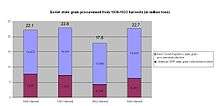Ministry of Agriculture and Food (Soviet Union)


The Soviet Ministry of Agriculture and Food was established in 1929 and known prior to 1946 as the People's Commissariat for Agriculture - Narkomzem).
The commissariat united all republican commissariats of the Soviet Union. It took over the Narkomzem offices located at Orlikov Pereulok, 1, Moscow, designed by Aleksey Shchusev. This building is currently occupied by the Ministry of Agriculture of the Russian Federation. It was formally known as the People's Commissariat for Agriculture (Russian: Народный комиссариат земледелия - Narkomzem) was set up in Petrograd in October 1917. Vladimir Milyutin was appointed the first People's Commissar of Agriculture. He was a member of the Council of People's Commissars.
The Narkomzem offices located at Orlikov Pereulok, 1, Moscow were designed by Aleksey Shchusev in 1928. This building is currently occupied by the Ministry of Agriculture of the Russian Federation.
Biological weapons research and production
Despite having signed the 1972 Biological Weapons Convention (BWC), the Soviet Union continued development and mass production of offensive biological weapons. These activities were conducted by a main directorate — "Biopreparat" — along with the Ministry of Agriculture and Food and several other Soviet ministries and agencies (Ministry of Defense, Ministry of Health, USSR Academy of Sciences, the KGB, etc.).[2] In the 1980s, the Ministry of Agriculture successfully developed variants of foot-and-mouth disease and rinderpest against cows, African swine fever for pigs, and psittacosis to kill chicken. These agents were prepared to be sprayed down from tanks attached to airplanes over hundreds of miles. The secret program was code-named "Ecology".[3]
People's Commissars of Agriculture
| Narkomzem Commissar | Term of office |
|---|---|
| Vladimir Milyutin | 8 November 1917 - 29 November 1917 |
| Alexander Schlichter | 29 November 1917 - 23 December 1917 |
| Andrei Kolegayev | 23 December 1917 - 1 March 1918 |
| Semyon Sereda | 1 March 1918 - 1 December 1921 |
| Valerian Obolensky | 1921 - 1922 |
| Vassiliy Grigor'yevich Yakovenko | 1922 - 6 July 1923 |
| Aleksandr Petrovich Smirnov | 1923 - 1928 |
| Nikolay Afanas'yevich Kubyak | 1928 - 1929 |
| Yakov Yakovlev | 8 December 1929 - 1 March 1934 |
| Mikhail Alexandrovich Chernov | 1 March 1934 - 29 October 1937 |
| Robert Eikhe | 29 October 1937 - 15 November 1938 |
| Ivan Aleksandrovich Benediktov | 15 November 1938 - 11 December 1943 |
| Andrey Andreyev | 11 December 1943 - 15 March 1946 |
See also
References
- ↑ "The Industrialisation of Soviet Russia Volume 5: The Years of Hunger: Soviet Agriculture 1931-1933 (9780230238558): R. W. Davies, Stephen G. Wheatcroft: Books". Amazon.com. 2010-03-02. Retrieved 2014-08-21.
- ↑ Ken Alibek and K Handelman (1999), Biohazard: The Chilling True Story of the Largest Covert Biological Weapons Program in the World Trade From the Inside by the Man Who Ran It, New York, NY: Random House.
- ↑ Alibek, Op. cit..
External links
| Wikimedia Commons has media related to Agriculture of the Soviet Union. |
